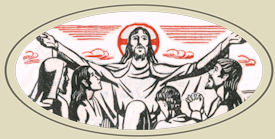» Enjoy our Liturgical Seasons series of e-books!
As the Father loves me, so I also love you. Remain in my love. If you keep my commandments, you will remain in my love, just as I have kept my Father's commandments and remain in his love. "I have told you this so that my joy may be in you and your joy may be complete. This is my commandment: love one another as I love you. No one has greater love than this, to lay down one's life for one's friends" (Jn 15:9-13).
Click here for commentary on the readings in the Extraordinary Form of the Roman Rite.
Sunday Readings
The first reading is taken from the Acts of the Apostles 10:25-26, 34-35, 44-48 and describes the reception of the first Gentiles into the Christian Church.
The second reading is from the first letter of John 4:7-10 in which he urges us to love one another, for we are sons of God whose very essence is love.
The Gospel is from St. John 15:9-17. It is only a few weeks since Good Friday when we commemorated the agonizing death of Christ on Mount Calvary. This was an excruciating, shameful death even for hardened criminals who deserved it. But for our loving Savior, the innocent lamb of God, one who had never offended God or neighbor, it was something of which the whole human race should be ashamed forever. What caused Christ that torment and death on the cross was our sins, the sins of all mankind and not the spite and hatred of his Jewish opponents, who were only instruments in the tragedy. Atonement had to be made to God for the sins of the world, so that men could reach the eternal inheritance which the incarnation made available to them. However, not all the acts of the entire human race could make a sufficient atonement to God. A sacrifice, an expiation of infinite value was needed. The death of the Son of God in his human nature was alone capable of making such an expiation.
That Christ willingly accepted crucifixion for our sakes, that he gave the greatest proof of love which the world has ever known, by laying down his life for his friends, did not make his sufferings any less, did not ease any of the pains of Calvary. His agony in the Garden before his arrest shows this: he foresaw all the tortures and pains which he was to undergo and sweated blood at the thought of what awaited him. But he was to keep his Father's commandment "not my will but thine be done." We Christians must have hearts of stone, hearts devoid of all sense of gratitude, when we forget what Christ has done for us and deliberately offend him! Alas, this is what all of us do sometimes, and many of us do all the time. Christ died to bring us to heaven but we tell him, by our sins, that he was wasting his time. We do not want to go to heaven, we are making our happiness here!
How far can human ingratitude and thanklessness go? Christ told us, through the disciples on Holy Thursday night, that he had made us his friends, his intimates. We are no longer servants in the household, who merely earn their daily wage and have no intimacy with the family and no hope of ever sharing in the family possessions. Instead, we have been adopted into the family by Christ becoming man, we have been guaranteed all the rights of children intimacy with the Father, Son and Holy Spirit and the future sharing in the eternal happiness of that divine household. Christ's incarnation made us God's children; Christ's death on the cross removed sin. Sin is the one obstacle that could prevent us reaching our eternal inheritance.
Because God gave us a free will we can in a moment of folly, a moment of madness really, deprive ourselves of the privileges and possessions which Christ has made available to us. We can choose to exchange an eternity of happiness for a few fleeting years of self-indulgence on earth. We can fling Christ's gift of love back in his face and tell him we don't want it. God forbid that we should ever act like this, that we should ever forget God's purpose in creating us. It is a marvelous thing to be alive, if we have hope in a future life. If nothing awaited us but the grave, then to live on this earth, which is a valley of sorrow and tears for the vast majority, would be the cruelest of jests. But of this we need have no fear. Life on earth is but a short prelude to our real existence. If we use this brief period as Christ has told us how to use it, death for us will be the passage into the eternal mansions. Be grateful to God, Father, Son and Holy Spirit; love the Blessed Trinity; prove your love by loving your fellowmen. By doing this you are fulfilling the whole law and the prophets; and you are assuring yourself of the place in heaven which Christ has won for you.
Excerpted from The Sunday Readings by Fr. Kevin O'Sullivan, O.F.M.
Commentary for the Readings in the Extraordinary Form:
Fifth Sunday after Easter
 "If you ask the Father anything in My Name, He will give it to you. . .Ask, and you shall receive, that your joy may be full" (Gospel).
"If you ask the Father anything in My Name, He will give it to you. . .Ask, and you shall receive, that your joy may be full" (Gospel).
Petition Sunday, followed by Rogation Days! We petition the Father's blessing upon springtime planting in the fields; yes, and in our souls. We ask in the "Name" of Jesus. He intercedes for us with the Father.
We must ask only for what keeps us on the Christian road. "I go to the Father," is the signpost on this road to which Jesus points. The Epistle warns us of a dangerous detour, if we ignore this road guide. Religion is vain unless one be a "doer" and not a "hearer" only. "Religion pure and undefiled" in our interior life, means keeping "oneself unspotted;" in our social life, it means the spiritual and corporal works of mercy to all "in their tribulation."
Excerpted from My Sunday Missal, Confraternity of the Precious Blood






